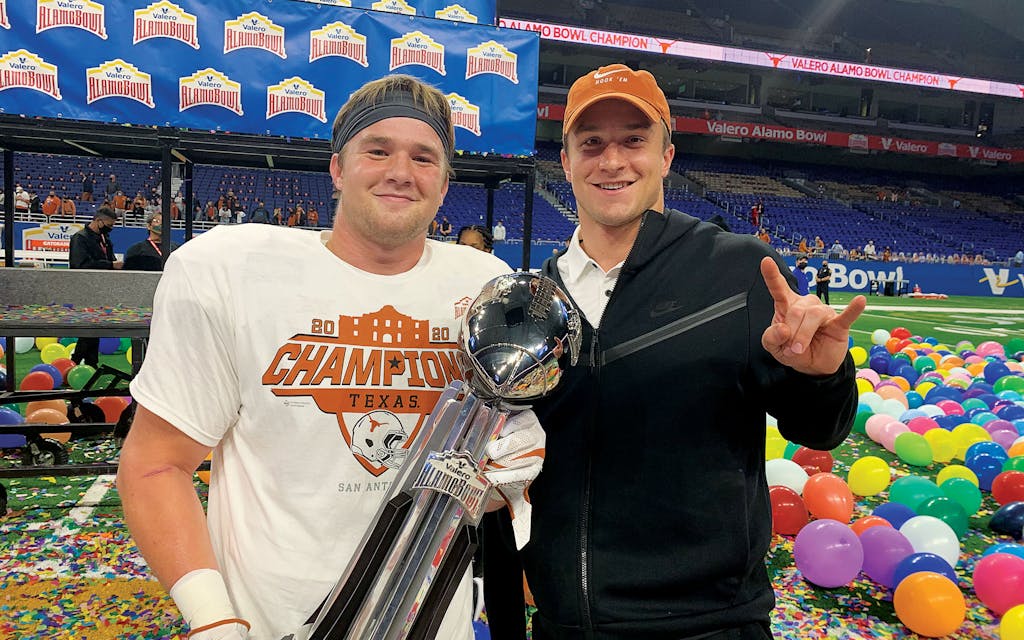On May 6, 2021, Jena Ehlinger was at a friend’s wedding in Mexico when she received a phone call from an Austin police officer. He told her that her twenty-year-old son, Jake, a student at the University of Texas, had been found “unresponsive” in a house in West Austin that he was renting with three friends.
Jena quickly flew home to be with her two other children: her daughter, Morgen, who was a senior in high school, and her eldest, Sam, who had spent the past four years as the Longhorns’ starting quarterback. Sam had flown in from Indianapolis, where he had just been drafted by the Colts. Jake was, by any measure, a young man with a bright future: he was a walk-on linebacker for the Longhorns and an honors student at UT’s McCombs School of Business who was about to start a prized summer internship at Dell.
“I thought we had endured our share of tragedy,” Jena, who’s 57, told me. Her husband, Ross, an Austin trial lawyer, had suffered a fatal heart attack in 2013 while competing in a triathlon. “I said to Sam, ‘What in the world happened? Could Jake have suffered a heart attack too?’ He said, ‘Mom, I hate to say this, but it sounds like it could have been fentanyl.’ And I said, ‘What the heck is fentanyl?’ ”
Texas Monthly: You weren’t alone. Even in 2021, there were still a lot of people who were just beginning to learn about the fentanyl epidemic. [Fentanyl is estimated to cause two hundred deaths a day in the United States—and five a day in Texas.]
Jena Ehlinger: Jake just wasn’t the type of person who would get caught up in something like fentanyl. Yes, he would drink at college parties. But he was like his older brother, a devoted athlete who took care of his body. And he was crazy smart. Jake came from an athletic and health-conscious family. He was full of life and joy and wasn’t going to screw up his life.
TM: But then toxicology tests revealed that Jake had ingested a Xanax tablet that had been laced with fentanyl and a few other drugs.
JE: We just couldn’t believe it. Apparently, from what we could gather, Jake was tired and stressed that night—he had a lot on his plate, from spring football practice to studying for his finals; he definitely had more anxiety the last six months of his life. And he decided to take a Xanax that we think he had ordered online. I know, it was not a smart decision. Jake had no idea if that pill had been doctored in any way. The next morning, one of his roommates found him in bed, not breathing. Jake just wanted to go to sleep, and it killed him.
TM: I read that two thousand mourners came to his funeral.
JE: I can’t describe the grief everyone felt. He was so loved because he always made people around him feel so good about themselves. For at least a year, I barely left the house. About the only time I went out was to take a seven-to-ten-mile walk, and I cried every step of the way. I’d lay in Jake’s bed, wearing one of Jake’s T-shirts, and I’d talk to him and pray. I always cried myself to sleep. I’d cry for so long that I could not believe my body was able to produce so many tears.
TM: What do you know about the investigation that the Austin police and the U.S. Drug Enforcement Administration conducted into Jake’s death?
JE: Not much. The DEA tried to get into his phone, hoping to find the name of the person who sold him the Xanax, but they couldn’t unlock it.
TM: Then, at some point, the medical examiner’s office wrote on Jake’s death certificate that he had died as the result of an accidental overdose.
JE: That was the phrase the medical examiner used: “accidental overdose.” The Austin police and the Drug Enforcement Administration let us know that because of the ruling, they officially had no crime to investigate. They closed their files on Jake’s death. I was crushed. I said, “But Jake did not die accidentally. Someone poisoned him!” Sam was so upset that he told me he wanted to come back to Austin and look for the people who sold Jake that Xanax. I said, “Sam, you need to be in Indianapolis so you can focus on football.”

TM: But you knew you had to do something.
JE: I was like, “How could we lose Jake? The world needs Jake because the world needs his brain and the world needs his joy. You have to do something with this. It’s got to have a purpose, otherwise the pain has no meaning.”
TM: You asked some attorney friends, Ed and Caren Burbach, if there was anything that could be done.
JE: I said to them, “If we can’t get Jake’s killers arrested, I at least want to make sure they will never have the chance to poison anyone else again.” The three of us decided to fight to change the law.
TM: And so the three of you began meeting with state legislators. You testified at legislative committee hearings.
JE: I felt like a fish out of water. I was a working widowed mother, a Longhorn football mom, not a political activist.
TM: What did you say to the politicians?
JE: We told them we wanted a law that would allow a medical examiner to classify a fentanyl overdose on a death certificate as fentanyl poisoning instead of accidental overdose. That way the cases could remain open and law enforcement could keep looking for the dealers who had sold fentanyl to someone who had overdosed. We also pushed for a law that would allow prosecutors to file murder charges against anyone who manufactures and delivers fentanyl, no matter how small—even one pill—to someone who overdoses and dies.
TM: I assume there were people who said, “Murder charges? Isn’t that a little too harsh?”
JE: Every day a lot of young people buy a common prescription painkiller from an online dealer. They don’t have any idea that the dealer has put some fentanyl into the drug in hopes of getting his clients high so they will start buying more pills. Sometimes those kids die from overdoses that are no fault of their own. This epidemic in our country must stop.
TM: Earlier this year, your proposals were incorporated into existing fentanyl bills that had been filed in the state Senate and House. The bills passed through the Legislature and were signed into law by Governor Greg Abbott. That’s not bad for someone who had never been involved in politics.
JE: I was on a mission. I was not going to let Jake die in vain.
TM: We’re having this conversation a little more than two years after Jake’s death. You have, since then, remarried and begun studying for a master’s degree in marriage and family therapy, and you’re working on obtaining a grief-counseling certificate. That’s a lot.
JE: I want to use my family’s experience to help others lift themselves above their own curveballs and tragedies. And I want to keep spreading the message to every young person I can about fentanyl’s dangers. If I can save one kid and one family from having to go through this, it’s worth every second.
TM: Are you still haunted because whoever gave Jake that pill has never been caught?
JE: Not haunted. I pray for that person’s soul—that he will realize the pain he is causing and stop what he’s doing. I pray for the souls of everyone who is manufacturing and selling fentanyl. We’re losing a generation of young people to that terrible drug. We’re losing good young people like my son. And it’s got to stop.
This interview has been edited for clarity and length.
This article originally appeared in the January 2024 issue of Texas Monthly with the headline “The ‘Longhorn Football Mom’ Who Made the Lege Pay Attention.” Subscribe today.
- More About:
- TM Talks
- Politics & Policy
- Texas Legislature
- Austin









